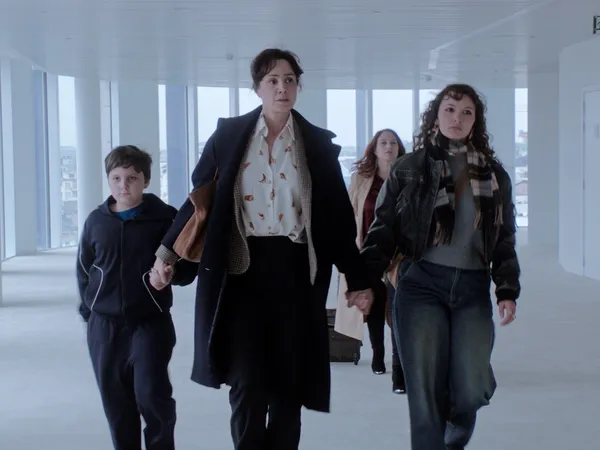Eye For Film >> Movies >> We Believe You (2025) Film Review
We Believe You
Reviewed by: Marko Stojiljkovic

The debut feature by Charlotte Deville and Arnaud Dufeys, We Believe You, walks the well-known path of courtroom dramas. However, it does so with originality and grace in reconciling formal rigour with heightened emotions, while clocking only 78 minutes.
At the beginning, it does not seem so, as the filmmaking duo opens their work with close-up shots of its protagonist and our point-of-view character, Alice (Myriem Akheddiou), from behind, the front and the side in shaky hand-held fashion. The presence of the actress who has had a number of episodic roles Dardenne brothers's films combined with such filmmaking style suggests a typical take on a typical topic of the struggle of an ordinary person with life itself. In this case, Alice has to calm her son Etienne (the newcomer Ulysse Goffin) down so they can proceed to the court to attend the custody hearing. The ten-year-old boy resists the very notion of it vigorously, even aggressively, but it seems that his older sister Lila (the up-and-coming Adele Pinckears) has a magic touch.

But, once the action moves inside, first into the waiting room and then into the room where the custody hearing takes place, the style changes completely to a series of static, symmetrical and cleverly composed shots. The filmmakers introduce the rest of the parties naturally and slowly, first near the edges of particular frames, only to move them to the centre of them later. The family is accompanied by their counselor Ms Alaoui (Alisa Laub), the other party, Alice’s ex-partner and the kids’ father (Laurent Capelutto) also has his representative, Ms Roland (Marion de Nanteuil) with him. Also present are the judge (Natali Broods) and children’s services’ attorney, Mr Comuzzo (Mounir Bennaouim).
The filmmakers also set the “rules of the game” for their film, which plays in the Perspectives section of this year's Berlinale. It is a single, possibly final hearing in the case that was reopened due to new information after it was preliminarily closed years ago. It is also connected with a criminal case against the father, who has been accused of incest and rape by Etienne. However, the hearing treats the mentioned investigation as an open one and every party has the right and the opportunity to state their truth.
Several things here theoretically work against the film. Firstly, the legal system in continental Europe is way less “movie-friendly” than the American and the British ones are. Also, custody hearings that take place in small, usually brightly-lit rooms can be tense, but not as tense as, for instance, murder or political trials set in the monumental court rooms. Additionally, the filmmakers decide to raise the emotional stakes so the laws of dramaturgy work properly because watching a custody battle between two decent people might seem mundane. So, everybody has to have skin in the game – for mother it is the wellbeing of her children, for the father it is his reputation. They also put the issue of the imperfections of any and every legal system under a magnifying glass, which is also something that has been portrayed in movies time and time again.
Regarding all that, the decision not to give the viewers some closure might seem as a cop-out move, especially because Deville and Dufeys are anything but impartial, as we can see from the closing textual info-card. Also, structurally, one extra epilogue sort of ruins the perfect symmetry of the prologue, the “body” of the plot and the immediate epilogue that play out almost in real time.
We Believe You works to perfection thanks to the dedication and stellar directing, acting and technical work. The directors develop the characters naturally both by positioning them within the frame and revealing the information about them in small dosed and on need-to-know bases. Also, they incorporate a significant amount of reaction shots which overturn the “talking heads” aesthetics and also reveal truths about characters while listening to other people’s testimony. That move also offers more opportunities to the actors while interpreting their characters, and they seize it. Complemented with the precise camerawork by Pepin Struye, inspired editing by Nicolas Bier, as well as Mathilde Lejeune’s minimalist production design and Lolita Del Pino’s music, We Believe You ends up as the type of film that keeps the firm grip on the viewers’ attention.
Reviewed on: 18 Feb 2025
















